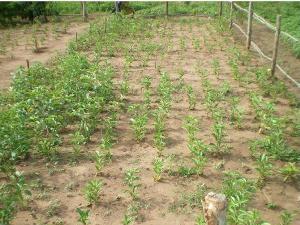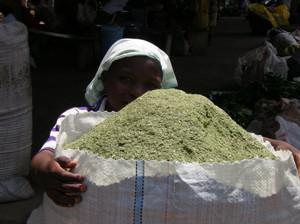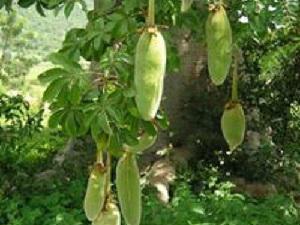Achille Ephrem Assogbadjo
Other projects
14 Dec 2006
Indigenous Knowledge, Genetic Diversity and Domestication of Baobab Tree in Benin
The purpose of this project is to promote strategies for the domestication and sustainable use of the multipurpose baobab tree in West Africa.

Demonstration plot.
According to the World Agroforestry Center and Bioversity International, the multipurpose baobab tree is expected to play a major role in future crop diversification programs and in the development of West-African agroforestry systems. This was also expressed by the rural people in semi-arid West Africa, who selected baobab as the number one species that would merit receiving more attention in future conservation and domestication programs. As it is, the project which is a follow up of our previous

Dry pounded leaves of baobab commercialised on local market.
Rufford Small Grants aims at

Capsules of baobab on the tree.
(i) building capacity of NGOs, local farmers on how to growth and propagate baobab tree within the traditional agroforestry systems;
(ii) producing a technical manual on the genetic diversity, distribution, uses and various propagation techniques of baobab and;
(iii) establishing a short-term seed bank and some home gardens of baobab to ensure the availability of plants for locals and seeds for further research.
Through the proposed project, appropriate manual (technical guideline, posters and pamphlets) will be produced for in situ and ex situ conservation strategies of baobab genetic resources as well as for germplasm collection and propagation techniques of the species. Therefore NGOs and local network community-based organizations will be trained and asked to be actively engaged to the dissemination of the included information within these extension papers. Also, propagation techniques already developed for the species will be targeted to the farmers, local NGOs involved in tree planting and rural nutrition, extension organizations and agricultural departments of local governments for the species’ restoration within the parklands agroforestry systems.
Also, a short gene bank will be established in the Laboratory of Applied Ecology of the Faculty of Agronomic Sciences in Benin for the conservation purposes. The seed lots to be collected for this small gene bank will include the representative gene pools in the country as well as the germplasm variation as perceived by local people. Moreover, local farmers and NGOs will be trained on how to set up the baobab home gardens at village level to ensure the permanent availability of leaves as the letters are daily used by locals (mainly in the dry areas) for their feeding during the shortage period. At all, the present project will contribute to the dissemination through linking farmers from several villages to learn from our previous research outputs in the first project financed by the RSG.